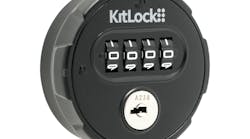A count of companies listed in domestic key blank books which have manufactured commercial locks amounts to approximately 48. Most of those 48 companies are either no longer in business, have merged with other companies, or are now part of a larger conglomerate. As example, one internet website shows that 34 different lock-related companies are listed as part of Assa Abloy. These same company changes have also taken place in the utility lock field as smaller companies have either disappeared or have been purchased by larger companies.
A strategy of some investors has been to spread their company holdings over several different industries. The hope is that all their holdings will do well but if one industry happens to have problems, their expectation is that holdings in other non-allied industries will not be affected.
If one company or industry holding in a group either has a problem or is doing extremely well, the parent company may decide to 'spin-off' that holding and form a new company. Examples in recent years are Master Lock and Strattec. Ingersoll Rand is the latest company to develop a spin-off.
IR stated, "Ingersoll Rand announced its plan to combine its commercial and residential security businesses into one, publicly held company. As a standalone publicly traded company, the new security company will be well positioned to execute a focused strategic plan to capitalize on industry trends and better serve customers."
"For example, the new security company will have the opportunity to invest in further innovation programs that will benefit customers – and the industry – as the security market transitions from mechanical to electro-mechanical security products in the building market. Because the new security company will benefit from synergies in sourcing, technology and assembly operations, it will have more financial flexibility to develop safety and security solutions such as electronic locking platforms, cards, readers and credential services that reduce cost and increase speed to market, as well as automate the specification process to reduce order-to-delivery cycle time."
The full article can be found on the Locksmith Ledger website.
After purchasing a group of lock companies, the holding company may also decide to divest those lock companies. An example of this is when Stanley Black & Decker decided to sell three companies as a package. The companies are Kwikset, Weiser and Baldwin.
The affect on locksmiths has been twofold. First, there are less actual products to choose from. Products from a given large manufacturer may contain individual brand names, but 'under the skin,' there is often less of a difference. Second, large companies have the funds and manpower to develop better products as compared to what some smaller companies have the resources to accomplish. We may not be able to influence who own what but we are now able to choose between the best of the best products for sales to our customers.





